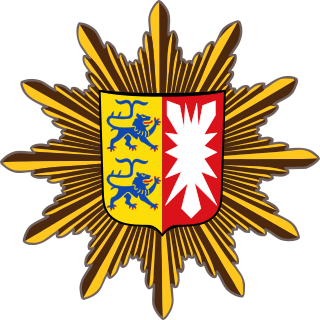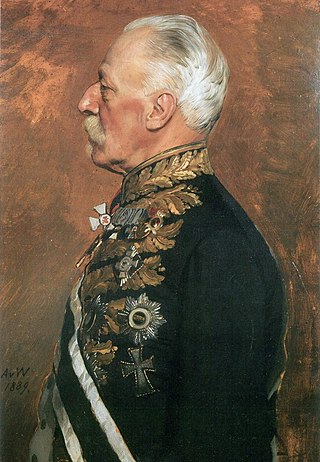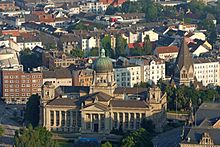
The Hamburg Metropolitan Region is a metropolitan region centred around the city of Hamburg in northern Germany, consisting of eight districts in the federal state of Lower Saxony, six districts in the state of Schleswig-Holstein and two districts in the state of Mecklenburg-Vorpommern along with the city-state of Hamburg itself. It covers an area of roughly 26,000 square kilometres (10,000 sq mi) and is home to more than 5.1 million inhabitants.

The Diocese of Hildesheim is a Latin Church diocese of the Catholic Church in Germany. Founded in 815 as a missionary diocese by King Louis the Pious, his son Louis the German appointed the famous former archbishop of Rheims, Ebbo, as bishop.

Norddeutscher Rundfunk, commonly shortened to NDR, is a public radio and television broadcaster, based in Hamburg. In addition to the city-state of Hamburg, NDR broadcasts for the German states of Lower Saxony, Mecklenburg-Vorpommern and Schleswig-Holstein. NDR is a member of the ARD organisation.

The Free and Hanseatic City of Lübeck was a city-state from 1226 to 1937, in what is now the German states of Schleswig-Holstein and Mecklenburg-Vorpommern.

Schleswig-Holstein Police is a state law-enforcement agency in Schleswig-Holstein, Germany. It is subordinated to the Schleswig-Holstein Ministry of the Interior, Municipal Affairs, Housing and Sports.
The government of Hamburg is divided into executive, legislative and judicial branches. Hamburg is a city-state and municipality, and thus its governance deals with several details of both state and local community politics. It takes place in two ranks – a citywide and state administration, and a local rank for the boroughs. The head of the city-state's government is the First Mayor and President of the Senate. A ministry is called Behörde (office) and a state minister is a Senator in Hamburg. The legislature is the state parliament, called Hamburgische Bürgerschaft, and the judicial branch is composed of the state supreme court and other courts. The seat of the government is Hamburg Rathaus. The President of the Hamburg Parliament is the highest official person of the Free and Hanseatic City of Hamburg. This is a traditional difference to the other German states. The president is not allowed to exert any occupation of the executive.

An Oberlandesgericht is a higher court in Germany.

Winterhude is a quarter in the ward Hamburg-Nord of Hamburg, Germany. As of 2020 the population was 56,382.
The Constitution of the Free and Hanseatic city of Hamburg is the basic governing document of the German city-state of Hamburg. It was approved on 6 June 1952. It is the fourth constitution that the state has had, consists of 76 articles, and has been amended 34 times.

The Hanseaten is a collective term for the hierarchy group consisting of elite individuals and families of prestigious rank who constituted the ruling class of the free imperial city of Hamburg, conjointly with the equal First Families of the free imperial cities of Bremen and Lübeck. The members of these First Families were the persons in possession of hereditary grand burghership of these cities, including the mayors, the senators, joint diplomats and the senior pastors. Hanseaten refers specifically to the ruling families of Hamburg, Lübeck and Bremen, but more broadly, this group is also referred to as patricians along with similar social groups elsewhere in continental Europe.

The Consulate General of the United States of America in Hamburg is a diplomatic mission representing the United States of America to the city of Hamburg and the State of Schleswig Holstein in the Federal Republic of Germany. The Government of Hamburg counts the promotion of the then Vice-Consul John Parish to the rank of a consul in 1793 as the establishment of the first mission. The consulate-general represents the interests of the United States government in the German states of Hamburg, Bremen, Lower Saxony, Mecklenburg-Vorpommern, and Schleswig-Holstein.
The State Office for the Protection of the Constitution is a state-level security agency in Germany.
The following is a timeline of the history of the city of Lübeck, Schleswig-Holstein, Germany.

The Evangelical Lutheran Church in Northern Germany is a Lutheran member church of the Protestant Church in Germany.

Neustadt is one of the inner-city districts of the Free and Hanseatic City of Hamburg, Germany.
Wilhelm Christian August Heering was a German botanist.

Daniel Christian Friedrich Krüger was a diplomat in the service of the city state of Lübeck and also jointly of the Hanseatic cities of Lübeck, Hamburg and Bremen. He was born in Lübeck on 22 September 1819 and died in Berlin on 17 January 1896.

Die Heimat was the title of a monthly journal that was published from 1891 to 2002 on the subject of the natural history and regional culture of Schleswig-Holstein and neighbouring regions. Since 2003, the journal has been called Natur- und Landeskunde: Zeitschrift für Schleswig-Holstein, Hamburg und Mecklenburg.

The Oberappellationsgericht der vier Freien Städte, since 1867 the Oberappellationsgericht der Freien Hansestädte, seated in Lübeck was an appeals court of the German Confederation and the North German Confederation with territorial jurisdiction for Bremen, Frankfurt, Hamburg and Lübeck. Frankfurt was removed from the court's jurisdiction in 1867 after its annexation by Prussia. In 1870 the court lost its subject-matter jurisdiction for commercial law to the Reichsoberhandelsgericht and was altogether abolished in 1879.

The Hamburg Regional Court is a court of ordinary jurisdiction and the only regional court in the district of the Hanseatic Higher Regional Court based in Hamburg. The first woman to head the Hamburg Regional Court was Konstanze Görres-Ohde, who held office from 1996 to 2001. Sibylle Umlauf was president from 2009 until her retirement on March 31, 2018. Marc Tully headed the court from September 2018 to November 2020.


















